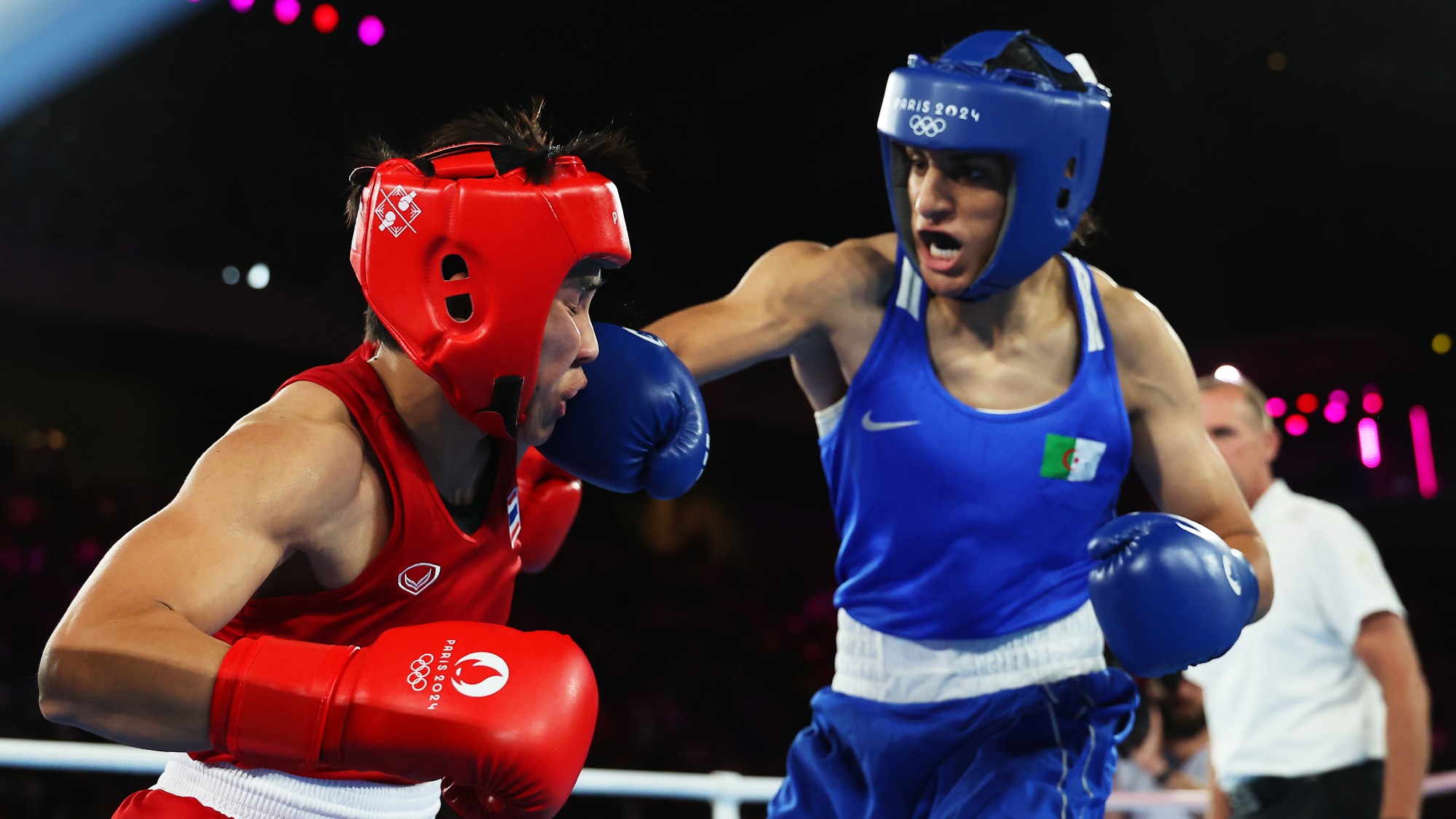Is banning transgender athletes from women's swimming fair?
The sharpest opinions on the debate from around the web


A free daily email with the biggest news stories of the day – and the best features from TheWeek.com
You are now subscribed
Your newsletter sign-up was successful
The International Swimming Federation (FINA), the world governing body of swimming, just voted to bar transgender women from competing in women's events. The "gender inclusion policy" offers the possibility of exceptions for swimmers who transitioned before age 12, but requires all other transgender women to compete in a new "open competition category." "This is not saying that people are encouraged to transition by the age of 12. It's what the scientists are saying, that if you transition after the start of puberty, you have an advantage, which is unfair," James Pearce, who is the spokesperson for FINA president Husain Al-Musallam, told The Associated Press.
Pearce said there were no transgender women currently competing internationally at the highest levels of the sport. Still, the decision addressed mounting objections sparked by the success of Lia Thomas at the college level. Thomas in March won the NCAA swimming championship in the 500-yard freestyle, becoming the first transgender woman to win an NCAA swimming title. Thomas said recently that transgender women don't threaten women's sports, but numerous athletes praised the decision. Rugby officials promptly banned trans women from their sport, and many expect soccer and athletics to follow soon. Is this necessary to eliminate the "unfair" strength advantage FINA says transgender women who transition have over other women, or is it a step backward for transgender rights?
This is only fair
"Common sense finally prevailed," says Christopher Trimoglie at The Washington Examiner. Lia Thomas vaulted to stardom after transitioning and shifting from competing as a man. The former University of Pennsylvania transgender swimmer "dominated the women's Ivy League swimming season" before winning a national championship. Liberals will try to brand this position as bigotry. Not so, argues Trimoglie. Letting transgender women who had the "biological advantages of male puberty" compete as women "was always unfair to the female athletes, but the adults protecting college student-athletes were too afraid to do the right thing."
The Week
Escape your echo chamber. Get the facts behind the news, plus analysis from multiple perspectives.

Sign up for The Week's Free Newsletters
From our morning news briefing to a weekly Good News Newsletter, get the best of The Week delivered directly to your inbox.
From our morning news briefing to a weekly Good News Newsletter, get the best of The Week delivered directly to your inbox.
This policy isn't fair to transgender women
People who support FINA's decision argue that cisgender women are "unlikely to ever win against a trans woman," says transgender athlete Kylie MacFarquharson in The Independent. If that were true, "I would entirely agree" with the new policy in swimming. But "the evidence pointed to in this case is usually about the performance gap between cisgender men and women, and does not account at all for the loss of performance throughout transition." Lia Thomas' time in the 500 freestyle rose by more than 14 seconds compared to before she transitioned. And her winning time in the NCAA championships was nine seconds slower than Katie Ledecky's record. And in the 100- and 200-yard freestyle, she finished eighth and fifth, respectively. "It's clear from her results that she is a talented swimmer, but the suggestion that she has some incredible advantage over the other swimmers is laughable."
It's discrimination, but it might work out
There's no denying FINA's policy is "discriminatory," says The Indian Express in an editorial, and a "blow to those trans-women who would want to seamlessly integrate into their new, identity-affirming life after transitioning." But there is no denying the science that "says that the advantages that those born male acquire at puberty are structural — larger lungs and hearts, longer bones, and bigger feet and hands — and cannot entirely be suppressed by hormone suppression during transitioning." Although this policy excludes them from women's events, it still could be a "step forward" for transgender acceptance. Instead of the backlash that was building over the question of fairness, FINA's move to "celebrate champions" in the new open category "could be seen as mainstreaming trans women in society. A gold is a gold," and honoring the best transgender women in elite sports could "serve as a platform to fast-track trans visibility."
Creating a third division will eliminate "the perception that transgender athletes are a 'threat,'" and "should do more to promote acceptance than the current setup," says Dan Wetzel at Yahoo Sports. It certainly will end the hijacking of the transgender athlete issue "by bigots and pandering politicians." There were legitimate fairness concerns, "even to many who are well-meaning and inclusive." This was the only solution fair to all. Now transgender athletes can be "free from sporting controversy," and focus on doing their best and exciting fans in their own competitions. "They have incredible stories to tell and races to run." Let's hope both sides can put the same energy they spent arguing this issue into supporting and celebrating both transgender and biologically female athletes. "That would be a win for everyone."
A free daily email with the biggest news stories of the day – and the best features from TheWeek.com
Harold Maass is a contributing editor at The Week. He has been writing for The Week since the 2001 debut of the U.S. print edition and served as editor of TheWeek.com when it launched in 2008. Harold started his career as a newspaper reporter in South Florida and Haiti. He has previously worked for a variety of news outlets, including The Miami Herald, ABC News and Fox News, and for several years wrote a daily roundup of financial news for The Week and Yahoo Finance.
-
 Women are getting their own baseball league again
Women are getting their own baseball league againIn the Spotlight The league is on track to debut in 2026
-
 Boxing at the Olympics: the row over sexual differences
Boxing at the Olympics: the row over sexual differencesTalking Point Controversy over Imane Khelif and Lin Yu-ting shines a spotlight on the murky world of gender testing – and the IOC's inaction
-
 TalkSPORT presenter Lynsey Hipgrave hangs up on caller who repeatedly addressed her as ‘love’ and ‘darling’
TalkSPORT presenter Lynsey Hipgrave hangs up on caller who repeatedly addressed her as ‘love’ and ‘darling’In Depth Lynsey Hipgrave told the football fan she was ending the call as he couldn't address her correctly
-
 Why gender could become an issue at the Rio Olympics
Why gender could become an issue at the Rio OlympicsIn Depth Changes to IOC regulations have caused the debate over transgender competitors to intensify



